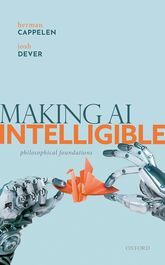
|
FreeComputerBooks.com
Links to Free Computer, Mathematics, Technical Books all over the World
|
|
- Title: Making AI Intelligible: Philosophical Foundations
- Author(s) Herman Cappelen and Josh Dever
- Publisher: Oxford University Press (June 22, 2021); eBook (Open Access Edition)
- License(s): CC BY 4.0
- Hardcover: 192 pages
- eBook: PDF (184 pages)
- Language: English
- ISBN-10: 0192894722
- ISBN-13: 978-0192894724
- Share This:

|
Can humans and artificial intelligences share concepts and communicate? This book shows that philosophical work on the metaphysics of meaning can help answer these questions.
The authors use the externalist tradition in philosophy to create models of how AIs and humans can understand each other. In doing so, they illustrate ways in which that philosophical tradition can be improved.
The questions addressed in the book are not only theoretically interesting, but the answers have pressing practical implications. Many important decisions about human life are now influenced by AI. In giving that power to AI, we presuppose that AIs can track features of the world that we care about (for example, creditworthiness, recidivism, cancer, and combatants).
If AIs can share our concepts, that will go some way towards justifying this reliance on AI. This ground-breaking study offers insight into how to take some first steps towards achieving Interpretable AI.
About the Authors- Herman Cappelen is a Norwegian philosopher. He is currently the Chair Professor of Philosophy at the University of Hong Kong.
- Josh Dever, Professor of Philosophy, University of Texas at Austin.
- Artificial Intelligence and Logic Programming
- Machine Learning
- Neural Networks and Deep Learning
- Robotics and Robot Programming

- Making AI Intelligible: Philosophical Foundations (Herman Cappelen, et al.)
- Book Homepage (PDF Download, etc.)
-
 What Was Artificial Intelligence? (Sue Curry Jansen)
What Was Artificial Intelligence? (Sue Curry Jansen)
Prescient autopsy of AI self-selling - the rhetoric of the masculinist sublime - is reprinted with a new introduction. Now an open access book, it's a message in a bottle, addressed to Musk, Bezos, and the latest generation of AI myth-makers.
-
 AI for Everyone? (Pieter Verdegem)
AI for Everyone? (Pieter Verdegem)
We are entering a new era of technological determinism and solutionism in which governments and business actors are seeking data-driven change, assuming that Artificial Intelligence is now inevitable and ubiquitous.
-
 Artificial Intelligence Technology (Huawei)
Artificial Intelligence Technology (Huawei)
This book aims to give our readers a basic outline of today's research and technology developments on artificial intelligence (AI), help them to have a general understanding of this trend, and familiarize them with the current research hotspots,
-
 Artificial Intelligence: Foundations of Computational Agents
Artificial Intelligence: Foundations of Computational Agents
This text is a modern and coherent introduction to the field of Artificial Intelligence that uses rational computational agents and logic as unifying threads in this vast field. Many fully worked out examples, expanded coverage on machine learning material, etc.
-
 Robots and AI (Lili Yan Ing, et al)
Robots and AI (Lili Yan Ing, et al)
The book explains new approaches on how robots and artificial intelligence affect the world economy by presenting detailed theoretical framework and country-specific as well as firm-product level-specific exercises.
-
 Artificial Intelligence for Big Data (Anand Deshpande, et al)
Artificial Intelligence for Big Data (Anand Deshpande, et al)
You will learn to use machine learning algorithms such as k-means, SVM, RBF, and regression to perform advanced data analysis. You will understand the current status of machine and deep learning techniques to work on genetic and neuro-fuzzy algorithms.
-
 Artificial Intelligence for a Better Future (Bernd Stahl)
Artificial Intelligence for a Better Future (Bernd Stahl)
This book proposes a novel approach to Artificial Intelligence (AI) ethics. AI offers many advantages: better and faster medical diagnoses, improved business processes and efficiency, and the automation of boring work.
-
 On the Path to AI: Foundations of the Machine Learning Age
On the Path to AI: Foundations of the Machine Learning Age
This book explores machine learning and its impact on how we make sense of the world. It introduces readers to the key concepts of machine learning, discusses the potential applications and limitations of predictions generated by machines using data.
-
 How Humans Judge Machines (Cesar A. Hidalgo, et al)
How Humans Judge Machines (Cesar A. Hidalgo, et al)
A detailed examination of people's reactions to machine actions as compared to human actions. Through dozens of experiments, this book explores when and why people judge humans and machines differently.
-
 The Amazing Journey of Reason: from DNA to Artificial Intelligence
The Amazing Journey of Reason: from DNA to Artificial Intelligence
This book analyses the evolution of complex structures (Organisms, or organized, living, systems) in the universe - from the subatomic particles after the Big Bang onwards - in order to understand the emergence of today's interconnected society.
-
 AI Art: Machine Visions and Warped Dreams (Joanna Zylinska)
AI Art: Machine Visions and Warped Dreams (Joanna Zylinska)
The book critically examines artworks that use AI, be it in the form of visual style transfer, algorithmic experiment or critical commentary. It also engages with their predecessors, including robotic art and net art.





